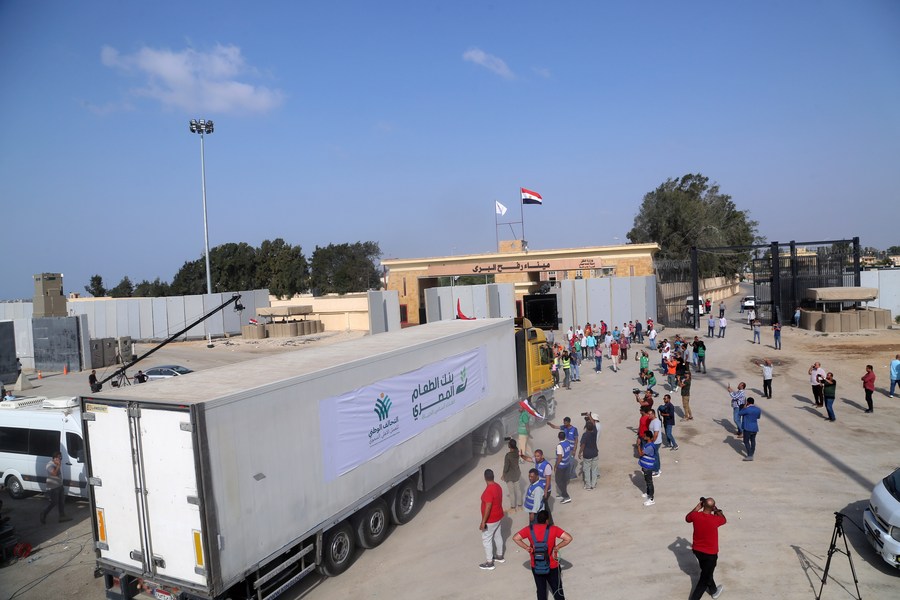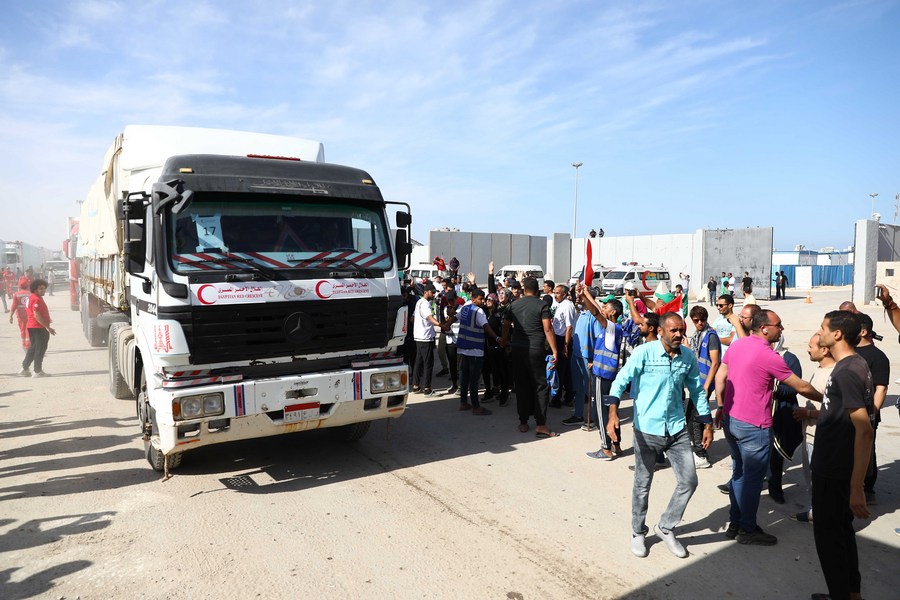
A truck loaded with humanitarian aid prepares to enter Gaza on the Egyptian side of the Rafah border crossing on Oct. 22, 2023.(Xinhua/Ahmed Gomaa)
No fuel means no functioning water desalination. No fuel also means that humanitarian partners will have to focus almost their entire aid delivery operation on transporting water. It also means no bakeries and no hospitals.
UNITED NATIONS, Oct. 23, 2023 -- Twenty trucks carrying humanitarian supplies entered Gaza from Egypt on Monday, far from being enough, said UN humanitarians on Monday.
The UN Office for the Coordination of Humanitarian Affairs (OCHA) said 20 trucks crossed the Rafah border point into Gaza on Monday. Half of the trucks were carrying UN supplies - water, food and medicine.
On Saturday and Sunday, a total of 34 trucks were able to enter Gaza with life-saving supplies. This is equivalent to no more than 4 percent of the daily average volume of commodities entering Gaza prior to this latest crisis, said OCHA.
A convoy of 20 trucks entered Gaza through Rafah on Saturday, the first in two weeks since the escalation of tensions between Israel and Palestinians.
Aid deliveries entering Gaza have not included fuel. The UN Agency for Palestine Refugees, or UNRWA, by far the largest humanitarian provider in Gaza, will exhaust its fuel reserves within the next two days, said OCHA.

Trucks loaded with humanitarian aid prepare to enter Gaza on the Egyptian side of the Rafah border crossing with Gaza on Oct. 21, 2023. (Xinhua/Ahmed Gomaa)
"No fuel means no functioning water desalination. No fuel also means that humanitarian partners will have to focus almost their entire aid delivery operation on transporting water. It also means no bakeries and no hospitals," it said.
The number of people internally displaced in Gaza is estimated at about 1.4 million, with nearly 580,000 people sheltering in 150 UNRWA-designated emergency shelters. Humanitarians warn about overcrowding, as the average number of people per shelter has reached more than 2.5 times capacity, it said.
The situation in hospitals remains dire, given shortages of electricity, medicine, equipment and specialized personnel. The Shifa Hospital in Gaza City, the largest in the strip, is currently treating some 5,000 patients, significantly over its capacity of 700 patients. This is in addition to approximately 45,000 internally displaced people seeking refuge within and around the hospital, said OCHA.
As of Thursday, the World Health Organization had documented 62 attacks on health care, affecting 29 healthcare facilities and 23 ambulances. Seven hospitals, all in Gaza City and northern Gaza, were forced to shut down due to the damage they sustained, lack of power and supplies, and evacuation orders, it said.
For the 14th consecutive day, Gaza remains under full electricity blackout, said OCHA.


